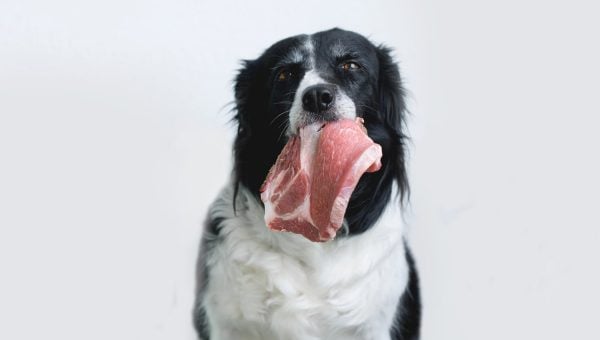- This post contains affiliate links. Read more here.
- Not a substitute for professional veterinary help.
Fish is an excellent source of protein and essential vitamins and minerals. Its nutrient-dense skin, too, is full of doggy-approved flavor and heart-healthy omega-3 fatty acids.
Can My Dog Eat Fish Skins?
Yes! Your dog can eat fish skins but only if they have been thoroughly cooked first. Raw fish skins may contain dangerous parasites and bacteria.
Why Is Fish Good For Dogs To Eat?
Fish has a variety of benefits for dogs. It’s packed with protein, relatively low in saturated fat and high in calcium and minerals like iron, zinc and potassium. Fish is also rich in omega-3 fatty acids which have anti-inflammatory properties. In puppies (and in pregnant and lactating females), omega-3s support the healthy development of the brain, eyes and central nervous system. In adult dogs, omega-3s support the skin and joints.
Because fish is highly digestible by dogs, it is often used as a protein source in commercial dog foods. It also makes a great addition to home-cooked meals or fed as a regular treat.
Are Fish Skins Good For Dogs To Eat?
Fish skins contain the same nutrients, vitamins and minerals as the fish flesh, making it an equally beneficial addition to a dog’s diet. Fish skins, however, should only be fed to dogs after having been thoroughly cooked. Prior to cooking, fish skins may contain parasites that can harm your dog.
Raw and undercooked fish also carry an increased risk of containing bacteria like salmonella, listeria and clostridium. These organisms can not only make your dog sick if they eat them, but preparing fish contaminated with harmful bacteria can also inadvertently make you sick, too.
If you are preparing a whole fish, surface scales should be removed before cooking and feeding the skin to your dog. It is also important to remove the head, fins and tail, as well as any leftover bones. If swallowed, fish bone fragments can scrape or even penetrate the lining of the digestive tract, the walls of the stomach or intestines.
Dogs should only eat fish skins that have been prepared and cooked with no additional oil or spices, including salt.
What Types of Fish Can My Dog Eat The Skins From?
Many of the fish species that humans eat are safe and healthy for dogs to eat, too. The best options are smaller fish that have been wild-caught or sustainably raised and are less likely to be high in mercury or contain excessive parasites. They include:
- Salmon
- Cod
- Catfish
- Herring
- Tuna (fresh or light canned tuna packed in water)
- Whiting
- Whitefish
- Sardines (fresh or canned and packed in water)
- Tilapia
When selecting fish for your dog, avoid those that have been farm-raised unless they meet sustainability standards. Farmed fish, particularly those from countries with lax industry standards, may contain harmful levels of antibiotics and toxins. Plus, under-regulated fish farms are terrible for the environment.
What Types of Fish Skins Should I Avoid Feeding My Dog?
Large fish that have had longer lives in the wild should never be fed to dogs. These species are likely to contain higher levels of harmful mercury and, because they are higher in the food chain and require more resources to survive, eating them is less sustainable. They include:
- Shark
- Swordfish
- Albacore tuna
- King mackerel
- Tilefish
How Do I Feed My Dog Fish Skins?
There are two primary ways to feed your dog fish skins: fresh cooked or dehydrated. Fresh fish – either in filet form or a whole fish that has been fully cleaned and deboned – can be baked in the oven, grilled or steamed plain with no added oils, spices or salt. Once cooked and thoroughly cooled, remove the skin from the fish and chop it into bite-sized pieces. The pieces can be mixed in with your dog’s daily commercial or home-cooked diet, or fed as treats.
To get the nutritional benefits of fish skin without going through the trouble of cooking it, try a dehydrated version. Chewy and long-lasting, dehydrated fish skins are a safe, healthy, boredom-busting alternative to rawhide, which can be difficult for dogs to digest. Some of our favorites include:
How Much Fish Skin Should I Feed My Dog?
Whether fed in fresh cooked or dehydrated form, fish skin can make a regular appearance in your dog’s diet. Because they are low in calories and saturated fat, they may even make a more healthful treat or meal mix-in for dogs that are overweight than pork- or beef-derived products. Before changing your dog’s diet or adding fish skin regularly, however, it’s best to check with your vet.
For More Information
We have a collection of articles on foods that are healthy or dangerous for dogs to eat, covering everything from grains, fruits, and vegetables. You might also be interested in reading “Can My Dog Eat Fish Oil?“






